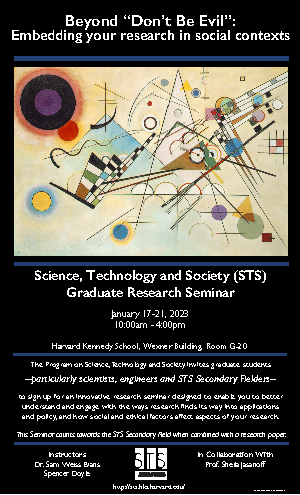Program on Science, Technology and Society at HarvardHarvard Kennedy School of Government | Harvard University |
|||||||
|
|
2023 STS Research Seminar:: Beyond 'Don't Be Evil': Embedding your research in social contextsJan 17-21, 2023, 10am-4pm AbstractThe STS Program invites graduate students--particularly engineers and STS Secondary Fielders--to sign up for an innovative research seminar designed to enable you to better understand and engage with the institutional channels through which research finds its way into applications and policy, and how social and ethical factors affect aspects of your research. This Seminar may count as a course for the purposes of the STS Secondary Field upon completion of an additional paper. No other course credit will be offered. Registration is required. If you are interested in taking this STS Research Seminar, please register here. Course DescriptionEngineers and scientists often pursue their research in the hope that their discoveries and inventions will benefit the world. Yet, few have significant insight into the institutional channels through which research finds its way into applications and policy, nor how social and ethical factors influence aspects of their research. This intensive one-week course is designed to help graduate science and engineering students grapple with the challenges of moving from research idea to social benefit (or harm) by providing a conceptual framework drawn from Science and Technology Studies (STS). The introduction of STS concepts will be linked to exercises in analyzing the students’ own research projects. The course will offer a mix of lectures, guest speakers, and intensive student participation. Students taking the course are expected to bring some ideas about the social aspects of their current or future research projects. Examples of issues to be considered include: What social, economic, and ethical assumptions are already reflected in the framing of your research? When is it appropriate to address questions about the ethical, political, and organizational issues you encounter in research, and which questions do you consider especially important to explore? What avenues, if any, exist for people outside your immediate lab group to question those assumptions? How do you reach out for feedback on the societal implications of your research, and to whom? Could you tailor your work to more explicitly engage, and possibly incorporate, social values? More broadly, the course will cover why these types of questions are currently so hard to ask in engineering training, and explore what can be done to change this. InstructorsSam Weiss Evans, Lecturer, School of Engineering and Applied Sciences and Senior Research Fellow, Program on Science, Technology & Society Spencer Doyle, PhD Candidate in Physics with a Secondary Field in Science and Technology Studies in collaboration withSheila Jasanoff, Pforzheimer Professor of Science and Technology Studies, Harvard Kennedy School
What previous students have saidIf you are a student interested in interdisciplinary work, a STEM graduate student frustrated by the myopic nature of your research, or just generally curious about systems of expertise and epistemology, I highly recommend this class. This one-week seminar offers an insight into the polyglot-like field of STS but framed in such a way to apply directly to your own graduate work. I found the course also served as finding a network of colleagues across scientific and humanities disciplines who were like-minded.
This seminar is a *must* for anyone who has ever wondered about how their research is situated in society—or frankly, even if you haven’t, I think any scientist has a lot to gain from this seminar. It is a non-negligible but very reasonable investment of time and work. And, for what you invest into the course, you’ll come out with a so much more rich understanding of what STS is, how it applies to your work, and importantly, connections to other STS scholars and scientists who are excited about helping you continue grappling with these ideas. Highly recommend!
The blend of abstract and concrete was really well done. I thought it was really nice how we kept pivoting back to our own research projects. . . Really welcoming space.
This course clarified a path forward to doing science and STS together, which is something that I was really struggling to figure out. The social component was also incredibly valuable – I am so glad to engage with the instructors and all the other students who are in similar intellectual stages.
I really appreciated having a space where questions about the impact of our work were treated seriously and academically. I thought the ideas about deficit models of the public and particular the critique of science communication as a goal were very profound, and definitely change the way I think about current debates in the science community/broader world.
|
||||||
